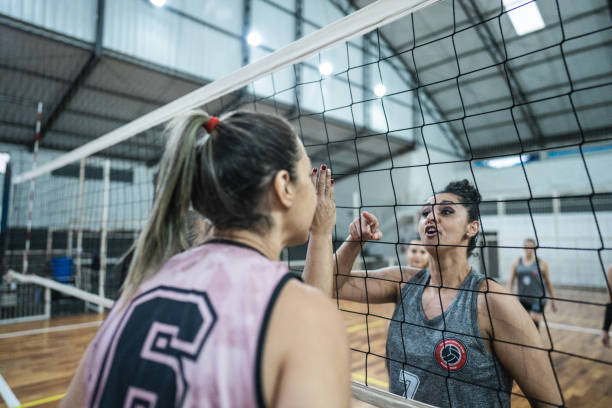Without officials, sports would undergo a dramatic transformation. Gameplay would become a chaotic blend of subjective interpretations and strategic exploitation of rules. Players, now self-appointed arbiters, would grapple with enforcing fairness while battling personal biases and the pressure to win. Disputes would escalate, potentially leading to a dominance of assertive personalities who could sway decisions, and gamesmanship, such as intentional fouling and time-wasting, would become rampant. The spirit of the game would be tested as players are more prone to cheating, potentially damaging relationships and causing a decline in sportsmanship.
What Differences Would We See in Sports if There Were No Officials?
The absence of officials would also drastically impact the fan experience. Controversial calls and endless debates would consume social media and sports talk shows, potentially overshadowing the athletes’ skill and passion. The focus would shift from objective evaluation to subjective interpretation, creating a polarized atmosphere among fans. Though video replays could help, the potential for violence might increase if there are no referees to maintain order and ensure the safety of players and fans. Ultimately, the legitimacy and appeal of sports could diminish without impartial oversight and the consistent enforcement of rules.

The Unseen Hand: What Sports Would Look Like Without Officials
Imagine a world where the piercing whistle of the referee is silenced, the umpire’s authoritative call fades into the background, and the linesman’s flag remains firmly planted. This is the world of sports without officials, a realm where the players themselves become the arbiters of the game, and the very fabric of competition is rewoven. While seemingly a simple change, the removal of officials would fundamentally alter the landscape of sports, impacting everything from gameplay and strategy to sportsmanship and fan experience. This post explores the profound differences we would witness in a world devoid of referees, umpires, and other officiating personnel.
Gameplay and Rule Enforcement: A Shift in Dynamics
The most immediate and noticeable change in a sports world without officials would be the alteration of gameplay and rule enforcement. Currently, officials serve as the primary enforcers of the rules, ensuring fair play and maintaining the integrity of the competition. Without them, the responsibility for adhering to the rules would fall squarely on the shoulders of the athletes themselves.
Self-Officiating: The Rise of Player Governance
In the absence of external authorities, self-officiating would become the norm. Players would need to actively monitor their own actions and those of their opponents, calling fouls, penalties, and violations as they occur. This would require a deep understanding of the rules and a commitment to fair play, as the temptation to bend or break the rules for competitive advantage would undoubtedly exist.
Increased Subjectivity and Disputes
Without impartial observers, the interpretation of rules would become highly subjective, leading to more frequent disputes and disagreements. What constitutes a foul in basketball, a strike in baseball, or an offside in soccer could become matters of intense debate, potentially disrupting the flow of the game and creating animosity between players.
The Dominance of Dominant Personalities
As one Reddit user pointed out, in the absence of referees, “the bully will get his way”. The dynamics of the game could shift, favoring those with strong personalities and a willingness to assert their interpretations of the rules. Less assertive players might be unfairly penalized or taken advantage of, leading to an uneven playing field.
Strategic Fouling and Gamesmanship
The absence of strict enforcement could also lead to an increase in strategic fouling and gamesmanship. Players might intentionally commit minor infractions to gain a tactical advantage, knowing that the likelihood of being penalized is low. This could result in a more cynical and less aesthetically pleasing style of play.

Sportsmanship and Ethical Conduct: A Test of Character
The removal of officials would place a greater emphasis on sportsmanship and ethical conduct. Without external oversight, athletes would need to rely on their own moral compass and sense of fair play to guide their actions.
The Spirit of the Game
In some sports, like ultimate frisbee, self-officiating is already a core principle. Players are expected to uphold the “spirit of the game,” prioritizing fair play and respect for opponents. However, even in ultimate, disputes and disagreements can arise, highlighting the challenges of relying solely on self-regulation.
The Temptation to Cheat
As one Reddit user noted, cheating is rampant even in self-officiated frisbee games where “there’s literally nothing on the line”. This suggests that the temptation to cheat exists regardless of the stakes, and without officials, it could become even more prevalent in high-pressure competitive environments.
The Role of Coaches and Team Leaders
In a world without officials, coaches and team leaders would play a crucial role in promoting sportsmanship and ethical conduct. They would need to instill a sense of responsibility in their players and emphasize the importance of fair play, even when it means sacrificing a competitive advantage.
Erosion of Trust and Respect
If cheating and unsportsmanlike behavior become widespread, it could erode trust and respect between players, creating a toxic environment that undermines the integrity of the sport.
The Fan Experience: A Transformation of Spectatorship
The absence of officials would also significantly impact the fan experience, altering the way games are watched and appreciated.
Increased Controversy and Debate
Without impartial rulings, controversial calls and disputed plays would become even more contentious, fueling endless debates among fans. Social media and sports talk shows would be dominated by discussions of “what ifs” and “should haves,” potentially overshadowing the actual on-field action.
A Shift in Focus
The absence of officials might shift the focus of spectatorship from objective evaluation to subjective interpretation. Fans might become more invested in arguing for their team’s perspective than in appreciating the skill and athleticism on display.
The Potential for Violence
In extreme cases, the lack of official oversight could even lead to violence, both on and off the field. As the search results mention, cities sometimes riot when their team loses or wins1. Without referees to enforce order, the risk of confrontations between players, coaches, and fans could increase.
Loss of Authority and Legitimacy
Ultimately, the absence of officials could diminish the authority and legitimacy of the sport, making it more difficult to take the results seriously. If games are perceived as being decided by biased players rather than objective rules, the overall appeal of the sport could suffer.
Specific Sports and Their Unique Challenges
The impact of removing officials would vary depending on the specific sport, with some facing greater challenges than others.
High-Contact Sports (Football, Basketball, Hockey)
In high-contact sports like football, basketball, and hockey, the absence of officials would be particularly problematic. These sports rely heavily on officials to monitor physical play, enforce rules related to safety, and prevent excessive violence. Without them, the risk of serious injuries would increase significantly.
Precision Sports (Baseball, Golf, Tennis)
Even in precision sports like baseball, golf, and tennis, the absence of officials would create challenges. Determining whether a pitch is a strike, a ball landed in or out, or a golfer violated a rule would become matters of subjective interpretation, leading to disputes and undermining the integrity of the competition.
Soccer
Soccer referees have to be running around for 90 minutes, and the game isn’t conducive to stoppages. The main reason referees aren’t punished severely for making wrong decisions is because they do not want to put pressure on the refs to make difficult decisions. Removing referees could be especially difficult because of the constant action.
The Economic Impact: Sponsorships and Revenue
The changes brought about by the absence of officials would undoubtedly have economic consequences for the sports industry.
Sponsorships
Sponsors may become hesitant to support leagues or teams if the legitimacy of the sport is undermined by inconsistent rule enforcement or rampant cheating.
Revenue
Declining viewership and attendance could lead to a decrease in revenue for teams and leagues, impacting player salaries, facility maintenance, and other essential aspects of the sport.
A Glimpse of Hope: The Potential Benefits
While the absence of officials would present numerous challenges, it could also offer some potential benefits:
Increased Player Responsibility
Athletes might develop a greater sense of responsibility for their actions and a stronger commitment to fair play, knowing that they are the primary guardians of the game’s integrity.
Enhanced Communication Skills
Players might improve their communication and conflict-resolution skills as they negotiate disputes and strive to reach agreements on the field.
Innovation in Rule Enforcement
The sports world might explore innovative ways to enforce rules without relying on traditional officials, such as video replay technology or player-based voting systems.
Conclusion: A World Transformed
The removal of officials would fundamentally transform the world of sports, impacting gameplay, sportsmanship, fan experience, and economic stability. While it might offer some potential benefits in terms of increased player responsibility and innovation, the challenges associated with self-officiating, subjectivity, and the potential for cheating and violence would likely outweigh the advantages.
Ultimately, the presence of officials, while not perfect, serves as a crucial safeguard for fair play, safety, and the integrity of the sport. Without them, the games we love would be unrecognizable, and the very essence of competition would be compromised.



